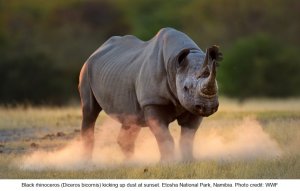 Rhinos have over the years faced risk of extinction due to their horns that are used in various Asian countries for medicinal value, as well as habitat loss over the years. However, with conservation efforts both from government, non-governmental actors, private sectors and other actors, the number of both the white and the black rhino has increased considerably over the years.
Rhinos have over the years faced risk of extinction due to their horns that are used in various Asian countries for medicinal value, as well as habitat loss over the years. However, with conservation efforts both from government, non-governmental actors, private sectors and other actors, the number of both the white and the black rhino has increased considerably over the years.
The Africa Biodiversity Collaborative Group featured Dr. Michael Knight, Chair, IUCN African Rhino Specialist Group and WWF Kavango–Zambezi Trans-frontier Conservation Area Trans-boundary Leader, to speak about the Situation of Rhino in Africa, as part of its Washington Dc, speaker series on March 15th 2019.
“Between 1970s and mid ‘80s, there was a total reduction in the number of black rhinos by 94% due to a combination of poaching, fragmentation and exploitation. In the 1970s there was a total of about of 40, 000 black rhinos in the continent of Africa with about 4,000 white rhinos. This number of black rhinos decreased drastically to a little above 2,000,” Dr. Mike Knight.
Knight explained that measures such as use of eRhODIS app which helps wildlife investigators link poachers to crime scenes, increased ranger patrol, policies that protect wildlife and increased involvement by the private sector have contributed to an increase in the number of Rhinos in the continent in this decade. . Introduction of rhinos to new ranges and the reintroduction into former rangers has played a significant role in the conservation of rhinos in Africa, with 75% of rhinos being reintroduced to former ranges. From 2012 to 2017 the proportion of white rhino in city and private land has gone up almost close to 15%. This has contributed to an increase in the number of rhinos in the continent.
This webinar recording of the event explains in depth the situation of the rhinos as well as challenges faced in conservation:
Featured speaker
Dr. Michael Harrison Knight, Chair, IUCN African Rhino Specialist Group / Kavango–Zambezi Trans frontier Conservation Area Transboundary Leader, WWF, holds an interest in the conservation of important charismatic species, such rhinos, given the present threat facing these species, and their flagship/ecological diversity status under which numerous other ecological and conservation related functions/issues hinge. In this regard, he chairs the IUCN African Rhino Specialist Group. He has a passion for Africa’s wild areas and its unique wildlife, as well as its close association with the people of the continent. Dr. Knight joined WWF in August 2018 as the Kavango–Zambezi Trans frontier Conservation Area Transboundary Leader. Prior to joining WWF, he served as the Senior General Manager of the Park Planning & Development section in the Conservation Services Division of SANParks, South Africa.


Add a Comment